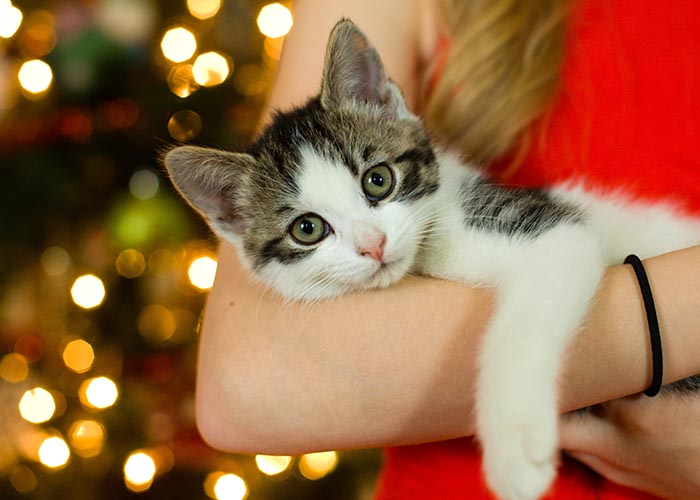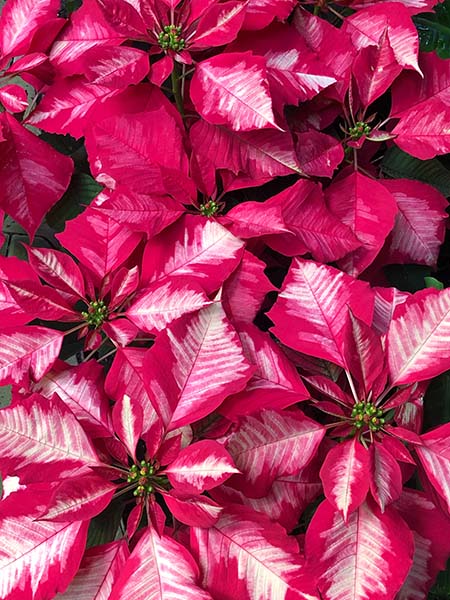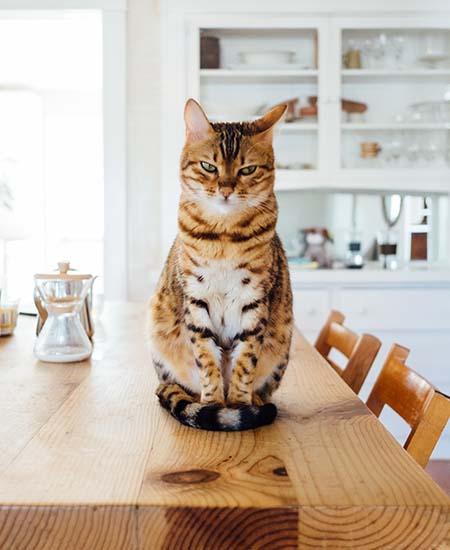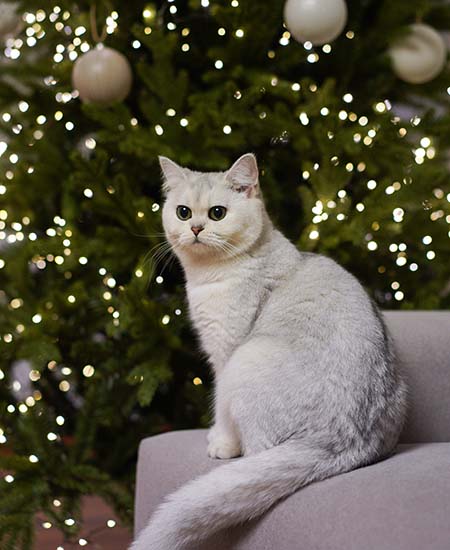
The holiday season has the opportunity to bring us together (even if it may be virtually this year!) and remind us of the importance of family. It also introduces new and potentially hazardous elements for your pets into your home. In this blog, we explore some important safety tips for your cats and dogs to keep them happy and healthy over the course of the holidays so that you can enjoy your time with your four-legged family members!
Avoid Poisonous Plants

Many indoor plants that are popular over the holidays can be toxic to your pets. While poinsettias are among the most widely known poisonous holiday plants, there are several other plants that you should monitor closely. Holly can cause digestive pain and excessive drooling if ingested, while mistletoe may cause a drop in blood pressure, respiratory distress, and even hallucinations. Amaryllis can cause lethargy, tremors, loss of appetite, and excessive vomiting.
Even plants that are not toxic can be hazardous to your pets’ health. For instance, the Christmas Cactus is not inherently poisonous, but your dog or cat’s mouth can be injured by the spines on the plant. Additionally, this sharp, fibrous plant can damage your pets’ digestive tract. Whenever you bring new plants into the house, it is advised that you monitor the plant closely and confirm that it is not toxic to the animals in your household.
Focus on Healthy Food
Generally, we recommend that you keep human food away from your pets and feed your pets food and treats that are formulated especially for them. However, there are some foods that you should be sure that you never share with your pets:

Turkey Skin: The fatty content of turkey can wreak havoc on your pet’s digestive system. Even in small doses, it has been linked to pancreatitis (inflammation of the pancreas).
Chocolate: While many of us love our Christmas and Hanukkah chocolates, it can be lethal for your pet. The level of toxicity can vary depending on the type of chocolate, amount of consumption, and size of your pet, but it is best to consider chocolate as off-limits to all of our feline and canine friends.
Candies and Baked Goods: Depending on their ingredients, these delicious foods can be toxic to our pets. Xylitol (an artificial sweetener) has been shown to cause liver failure in dogs. Other popular additives, such as raisins, grapes, and chocolate chips can cause digestive upset or even death.
Make sure that you clear the table promptly after eating to ensure that your pet does not accidentally ingest leftover foodstuffs. If you will be leaving the home, take the trash out before you leave to make sure your pets do not get into leftover food or other toxic items.
If you believe your pet has eaten something poisonous, quick action is imperative. Call your veterinarian or emergency vet clinic immediately. You might also consider calling the ASPCA Poison Control Hotline at (888) 426-4435 with your animal poisoning questions.
Pay Attention to Lighting
Twinkling lights are a hallmark of the season, captivating both humans and animals alike. Many pets are inexplicably attracted to the cords of electric lights and may choose to chew on them. This may cause burns in their mouth or worse. For safety’s sake, pay close attention to your pet whenever the lights are turned on and unplug the lights whenever you leave your home.
Candles should only be used under direct supervision. They should also only be used in a safe location, well away from playful paws or errant tails. Never leave your pet unattended with a lit candle.
Manage Christmas Trees
For many homeowners, Christmas trees are the centerpiece of the holiday celebrations. However, it is important to note that there are several safety concerns that surround this traditional decoration.

Secure your Christmas tree to prevent it from falling over, especially if you have a frisky kitty who likes to climb. This can easily be accomplished with rope or strong fishing line and attaching it to the ceiling, wall, or door frame. Also, in the case of live trees, purchase a tree stand with a wide base to make it less likely to tip.
Try to decorate with unbreakable ornaments, particularly along the bottom of the tree. This is particularly important if you have a playful pet. Glass ornaments can easily break if the tree is tipped over or if they are knocked off the tree. Homemade ornaments, particularly salt dough ornaments, should be kept out of reach because they can be toxic if eaten by your pet. Tinsel should be avoided if you have pets; it has been shown to cause intestinal blockages when ingested.
For those with live trees, it is important to keep it well-watered to prevent potential fire hazards. However, if you have pets, we do not recommend using any water additives, such as sugar, baby aspirin, or commercial Christmas tree water additives. By utilizing only plain water, it will not be a health concern if your pet drinks from the tree stand.
A Place to Relax
For your pet’s mental and physical well-being, it is important to give them a safe place to retreat to, away from the hustle and bustle of the holiday festivities. Set your pet up with a comfortable and quiet environment away from your family and guests. This can be a spare bedroom or even a crate in the corner of the mudroom, but however big it is, it should be a safe sanctuary for your pet. It is important to respect your animal’s wishes and privacy whenever they choose to move away from the holiday commotion.
We hope that these helpful hints and tricks make it easier for you to enjoy the holiday season with loved ones… four legs or two! With a bit of planning, you and your pets can take in every magical moment together.
What tips do you have to keep your pets safe during the holidays? Share them in the comments below!
